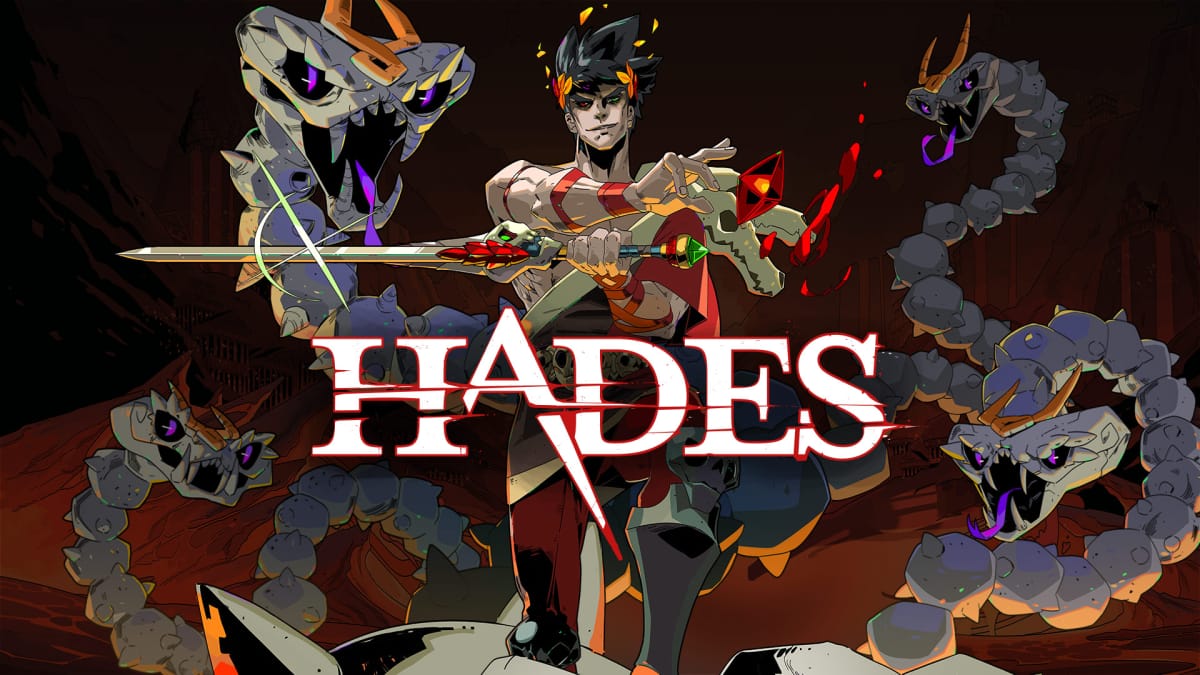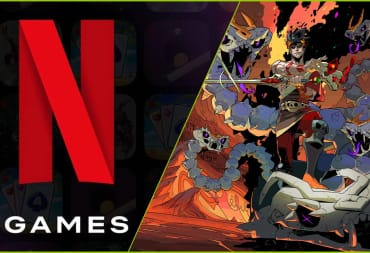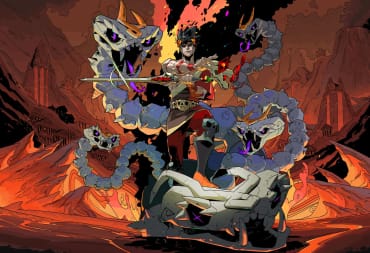On paper, Hades appears to be a rogue-like dungeon crawler, similar to The Binding of Isaac or Darkest Dungeon, but in practice it feels much more like a Platinum Games (Bayonetta, Nier Automata) affair. I have never been the biggest fan of rogue-like games. I typically don't like isometric perspectives or games that force you to restart at the beginning upon death. I was even feeling burned out on Greek Mythology after Assassin's Creed Odyssey, but as a lover of Supergiant's previous titles, Bastion and Transistor, I had to see what they had cooked up this time. It speaks to the game's quality that, despite my reluctance towards its components, Hades has become my favorite game of 2020 thus far.
The player will control Zagreus, son of Hades, as he attempts to escape the underworld over and over again. Each death is canonical, so every time you die you'll wake up back in the House of Hades with all the materials you've gathered thus far. Each time you die you will restart at the House, so yes, "beating the game" consists of surviving a single run through all seven levels of Hades, from Tartarus to Elysium.
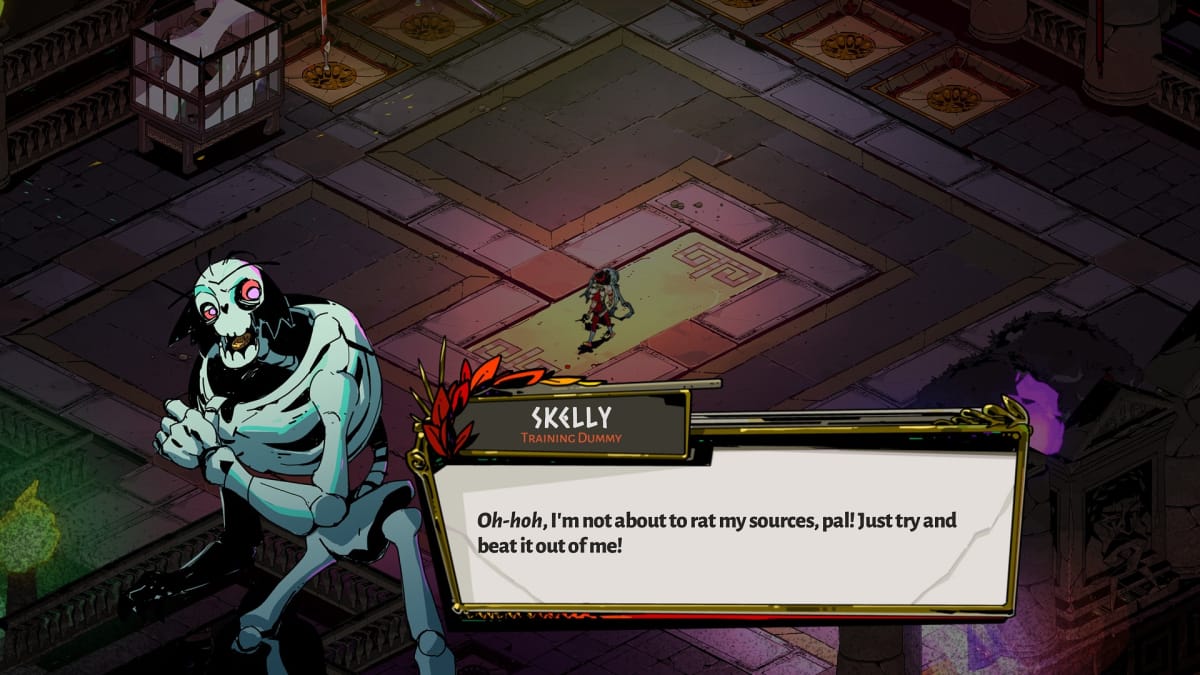
Zagreus discovers a note in his father's desk that reveals that Persephone is his mother, and not Nyx as he was raised to believe. Persephone escaped the underworld shortly after Zag was born, and he decides to track her down. He lies to the Olympian gods and claims that he wishes to join them on Olympus, when truly he is only planning to use their powerful gifts to help him escape and find his mother. Zag has a, well, let's say strained relationship with his father, so it's natural that he'd become determined to find his reportedly loving mother. Hades presents a compelling story, especially with Nyx serving as a main character and offering maternal support to her adoptive son. Real relationships form throughout with other denizens of the underworld, such as Achilles, Sisyphus, Meagara and Skelly the undying skeleton.
During your runs, you'll encounter several Olympian gods who wish to grant you boons (new powers and upgrades) based on their domain. Poseidon may lend you water powers, while Dionysus, the god of wine, deals in poison powers. Hades has smatterings of an RPG throughout - you'll be working on the best "build" for your character, but the Olympian boons you have the opportunity to access each run are randomized, so you can never really play the same way twice. When you die, your boons disappear. If you're suspicious of Zeus and Hera granting superpowers to Zagreus for free, you're right to be - eventually two gods will appear at once, each demanding that you accept their boon. I think you can guess what happens when you turn one of them down.
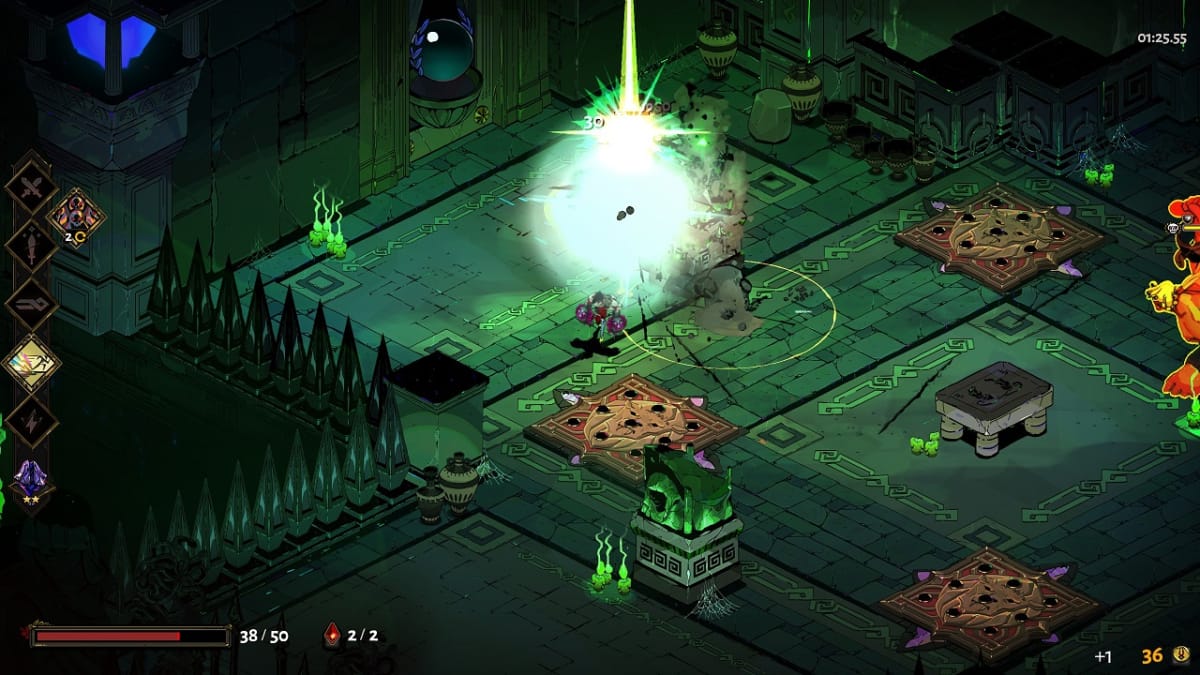
Rooms are never really the same twice, although some will start to look familiar after five or six hours. Each level of Hades has different enemies that are themed around that level's aesthetic, such as Asphodel, the lava area, containing mostly fire and skeleton creatures. There is a perfect variety of enemies present; just few enough that you can master fighting each one but not so few that you'll get bored. Each room also contains traps like spikes and falling rocks that will damage enemies just as easily as they damage you. Tricking enemies into activating traps will become second nature after a few runs, and there's not much more satisfying that a big fat Lout exploding after falling in a spike pit.
Before each run, you'll head to the Mirror of the Night (gifted to you by Nyx) to handle your permanent power-ups. Think of the Mirror as your RPG skill tree - more skills will open up as you advance through the game, lending you increased attack power, more health, and multiple resurrections. The idea of breaking out of the entirety of Hades in one go is daunting at first, but once you have access to resurrections mid run you'll become a bit more optimistic. After that you'll meet with Skelly to choose your weapon for that run, of which there are eight. Each one plays very differently, but by offering bonuses on certain weapons for each run Hades coaxes you into trying them all out. My favorite is by far the shield, Aegis; it does a far better job of making you feel like Captain American than the Avengers game does.
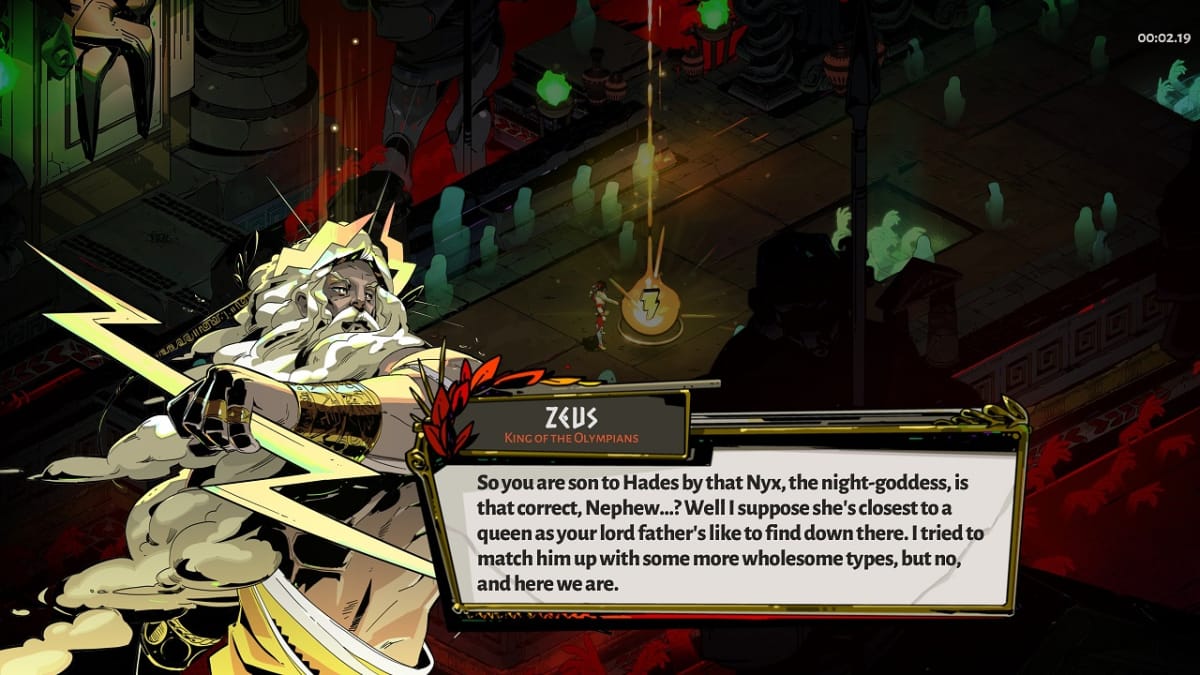
Each room is filled with monsters that spawn in waves, and you'll need to clear the room to claim its prize and move on to the next. Combat itself is extremely quick without a millisecond of downtime; you have a special attack, normal attack, dash attack and spell attack to survive encounters. Each weapon upgrades has many upgrade paths, and each weapon resets upon death, so combat will have notable differences each run. Athena providing a shield to your dash is quite different than Poseidon giving you a knockback wave dash, but both are equally viable. You'll eventually discover some gods' powers are more compatible with your play style - Poseidon's crowd control powers suit me well, but Ares's intimidation powers or Aphrodite's charms might serve you better personally.
Most rooms have two exits, each advertising a different reward in the next one, so if you're low on health you'd likely choose a room with a heart. If you're all full on health, you might choose a room with coins to help save up for your next meeting with Charon, the shopkeeper. The following rewards might be advertised on each door: health, Darkness to upgrade your skills, crystals to upgrade your bedroom, gold, pomegranates to upgrade your weapons, boons from different Olympians, Nectar to boost your affinity with NPCs, permanent powerups from Sisyphus or Chthonic Keys to unlock more skills. Between the relenetless fights in each room, there's a certain strategy to choosing what to do next. Spend coins at the fountain to get more health or save them to get a boon from Charon? Go for a Chtonic Key because you need just one more to get the next weapon, or maybe go for Darkness because you're just ten away from a second resurrection? Do I have enough health to sacrifice half of it to Chaos for a Cursed Blessing? Hades is just as much a strategy game as it is an action game, and it's in that decision-making that it truly shines.
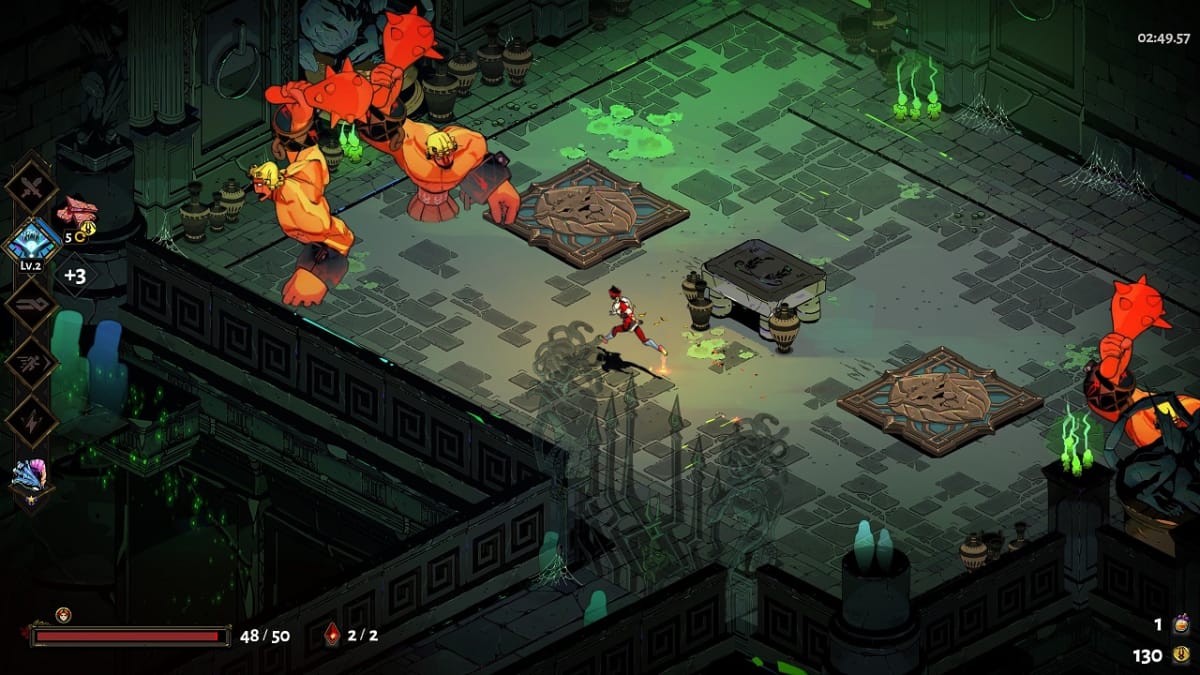
The core reason I have come to love Hades so much is that it has forced me to become more resourceful than I thought I was. Every time I think I'm about to die, I figure something out to stay alive for just one more room. Every time I think hope is lost, I figure out a new combo that works especially well on a specific enemy or realize I've learned the attack patterns of a boss without noticing. It's similar to the reasons I love Prey and Zelda: Breath of the Wild : those games brought out a resourcefulness I didn't know I was capable of. I have gotten farther each run because of the increased power-ups, sure, but mostly it's due to my skill level increasing. The progression is paced so well that you'll never feel like you're too much out of your depth; conversely, you'll never feel like you're totally in control either. The first five runs, I was struggling to even make it to the fifth room. On my 20th run, I'm beating the first boss without taking any damage, and it's because of my increasing skill as a player.
I'd like to share a specific moment that cemented Hades as my likely game of the year. On my fourth try fighting Maegara the Fury, the boss of the first level, I was down to my last bit of health. She was so close to dying, but I knew I would be dead any moment. Suddenly and without warning, Podeidon appeared and yelled "Ride the wave, Nephew!" Suddenly I was riding a tidal wave across the arena, knocking out minions left and right and eventually drowning Meagara in a sea of fury. I wasn't told this was something that could happen, and I suspect it's because I boosted my affinity with Poseidon by accepting his boons and offering him Nectar, but in that moment I was more exhilarated than I have been in a video game all year.
The wonderful and distinctly Greek pottery-inspired artwork coupled with veteran composer Darren Korb's intense guitar riffs and the whimsical but petty representations of the gods provide a real sense of identity to Hades, providing a fresh taken on the very tired aspects of Greek Mythology. I'd venture to say this is Korb's best work yet, outdoing his own scores on Bastion and Transistor (both of which also have phenomenal soundtracks). There are still a few months left, but I'll be shocked if anything upsets Hades as my personal game of the year for 2020. Supergiant has presented a fresh take on roguelikes, action games and Greek Myths by combining their component parts. The only negative thing I can say about Hades is that I played it for so long my thumbs began to hurt, and I still couldn't put it down. Just one more run, I'd tell myself, over and over. I absolutely recommend Hades to everyone.
TechRaptor reviewed Hades on PC with a code provided by the publisher. Hades is available on PC and Nintendo Switch.
Review Summary
Pros
- Beautiful artwork and blood-pumping music
- Fresh Takes on Tired Greek Myths
- High-Octane Action Feels Exhilarating
Cons
- Occasionally Repetitive
Have a tip, or want to point out something we missed? Leave a Comment or e-mail us at tips@techraptor.net
